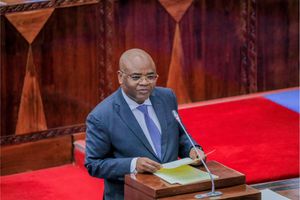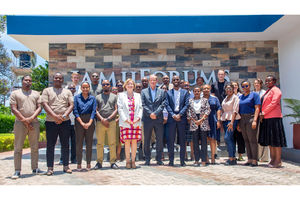Gaming Board tax revenues jump 400 percent in six years

What you need to know:
- The sector’s contribution to government revenues has been on an upward trajectory, soaring from Sh33.6 billion in 2016/17 to Sh170.4 billion in 2022/23, marking an average increase of 407.1 percent per year during that period
Dar es Salaam. In recent years, the Gaming Board of Tanzania (GBT) has been witnessing a remarkable surge in revenue from the gaming sector.
According to the director-general of GBT, Mr James Mbalwe, the sector’s contribution to government revenues has been on an upward trajectory, soaring from Sh33.6 billion in 2016/17 to Sh170.4 billion in 2022/23, marking an average increase of 407.1 percent per year during that period.
“From July to December 2023, for this financial year 2023/24, we had already collected Sh108.16 billion, and we believe that due to the pace of education and inspection we are conducting, by the end of this year, we will collect no less than Sh200 billion as tax revenue,” Mr Mbalwe stated in a recent meeting with media editors.
Gambling, which encompasses various forms of gaming and betting, has become a big contributor to government revenue, with Sh78.7 billion in 2017/18, Sh95.8 billion in 2018/19, Sh89 billion in 2019/20, Sh131.99 billion in 2020/21, and Sh148.9 billion in 2021/22.
Mr Mbalwe further emphasised that GBT has registered a total of 91 companies operating in this sector, generating both formal and informal employment for more than 25,000 individuals.
Moreover, GBT collects a five percent tax from sports betting every month, which is then submitted to the Tanzania Sports Council to be spent on various sports activities.
However, amidst the glowing revenue figures, concerns have been raised regarding the potential negative impact of the gambling industry on the nation’s youth workforce.
Some stakeholders and religious groups fear that excessive engagement in gambling activities may lead to a loss of productivity among the youth.
In response to these concerns, the director of services at GBT, Mr Daniel Olesumaiya, highlighted the board’s commitment to promoting responsible gaming practices.
“We have successfully promoted the concept of responsible gaming, where we encourage participation in these games to be moderate to eliminate the possibility of addiction and prohibit children from participating in these games,” Mr Olesumaiya affirmed.
He said that despite the challenges posed by the continued growth of the gaming sector, GBT remains vigilant in its efforts to ensure that the industry remains a positive contributor to the country’s economic growth.
Mr Olesumaiya stressed the importance of increased regulation and collaboration with other government authorities to address these challenges effectively.
The development of Gaming laws in Tanzania came after development of Gaming Industry in Tanzania, Gaming Industry in Tanzania was previously regulated under the Pools and Lotteries Act, 1967 and the National Lotteries Act, 1974.
After economic liberalization the Gaming Act Cap. 41 was enacted. It provided for the creation of the Gaming Board of Tanzania which is responsible to regulate Game Activities





